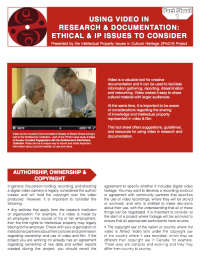IPinCH has embarked on an initiative to produce a series of Fact Sheets on different aspects of intellectual property (IP) to meet the needs of community members, researchers, and policy makers. These are designed to make information on key IP topics readily available in an easy-to-use format.
The first of these, “Using Video in Research & Documentation: Ethical & IP Issues to Consider,” is now available on the web, and also in print, for distribution at conferences and events. There are many other topics to consider and we need your feedback.
There are currently two forms of Fact Sheets being developed: 1) Basic Information; and 2) “How-to” guides. Examples of each are presented below:
1) Basic introductions to specific IP-related topics:
- What is intellectual property (IP) and how does it interface with heritage research?
- Who owns the results of research?
- What is “appropriation” and “commodification”?
- Cultural heritage and copyright
- Cultural heritage and trademarks
- Community review of research
- Collaborative research planning
- Informed consent
- Native Art: What’s fake or real?
- IP issues with ancient DNA
2) “How to” Guides:
- Crafting Memorandum of Agreement (MOA) and Memorandum of Understanding (MOU)
- Developing community protocols for heritage research
- Connecting communities with distant collections
- Crafting community-research agreements
- Creating and sharing research benefits
- Working with external researchers
- Protecting images and designs
- Repatriating knowledge/images from museums
- Protecting/nurturing forms of traditional knowledge
- Inventorying heritage-related IP for your community
- Doing community-based research in the university: dealing with Institutional Review Boards and funding transfers
- Developing collaborative writing / publishing projects
It’s clear that there is much interest in this series. At the recent Native American and Indigenous Studies Association (NAISA) conference, we asked community members who stopped by the IPinCH booth what topics on this list were of most interest to them and the reply was invariably “all of them.”
Next Steps
We’re now looking for feedback on this series and for ideas for additional topics. We’re particularly interested to know what Fact Sheets our own network of community-members, researchers, and policy makers would find useful. What specific subjects would be most helpful for you? Do any of these topics seem redundant or impractical? Are there other topics that IPinCH could cover? Please email Kristen Dobbin with any comments on the existing list, or suggestions to add to it.
Finally, are you interested in developing a Fact Sheet? Here’s how it works: Fact Sheets can be created by an individual or ad hoc group within IPinCH, or as a Working Group initiative. Once a draft is developed, it’s circulated to experts on that topic to fact check and add additional information. Following this, the text and images are formatted and the final copy is checked and distributed. Please let Kristen Dobbin know of your interest to develop an IPinCH Fact Sheet.






